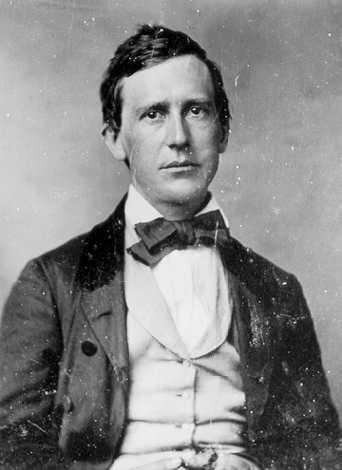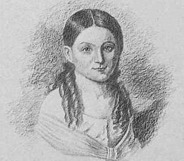
Stephen Collins Foster
War stories can be fascinating, indeed. However, Captain Pentland’s household contained two delectable objects that immediately fueled Stephen’s imagination. You see, the Pentland’s owned a square piano. Square pianos were not common household items at this time, and they certainly were seriously expensive objects of prestige, wealth and distinction. For young Stephen, who only owned a flute and a guitar at this time, the Pentland piano opened up a completely new musical world. He spent hours on end exploring the possibilities of the instrument, and according to Captain Pentland “Stephen became rather skilled in the art of improvisation.”
Captain Pentland also had a fair young daughter, and Stephen was just at an age to notice girls. Susan Pentland was described as “fair and energetic,” and the children frequently played together in the back yard. In the Broadway-style show “The Stephen Foster Story,” young Stephen has a torrid affair with little Susan. Given that Stephen was sixteen and Susan only eleven at the time, this assumption does sound like a slight exaggeration. In later years, Susan sang the soprano part in a Stephen Foster Quartet, sharing the stage with Jane McDowell. Jane eventually became Stephen Foster’s wife, and Susan married Andrew Robinson, one of the “Five Nice Young Men” from a group of young writers and journalists.

Susan Pentland
Open thy lattice, love, listen to me!
The cool balmy breeze is abroad on the sea!
The moon like a queen, roams her realms of blue,
And the stars keep their vigils in heaven for you
Ere morn’s gushing light tips the hills with its ray,
Away o’er the waters away and away!
Then open thy lattice, love, listen to me!
While the moon’s in the sky and the breeze on the sea!
Open thy lattice, love, listen to me!
In the voyage of life, love our pilot will be!
He will sit at the helm wherever we rove,
And steer by the load-star he kindled above
His shell for a shallop will cut the bright spray,
Or skim like a bird o’er the waters away;
Then open thy lattice, love, listen to me!
While the moon’s in the sky and the breeze on the sea!
The song was published two years later by George Willig of Philadelphia, and quickly became a much-enjoyed standard in Allegheny parlors. Miss Sue was predictably flattered!
Stephen Foster: Open thy Lattice Love


Though, I am very interested in the source of the etch of Susan Evans Pentland.
thank you so much ,
her great-great granddaughter.